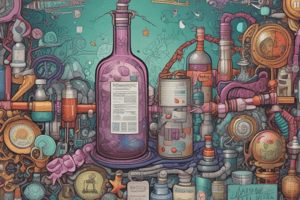Podcast
Questions and Answers
What is the maximum quantity allowed for an emergency oral prescription for controlled substances?
What is the maximum quantity allowed for an emergency oral prescription for controlled substances?
- A ten-day supply
- Unlimited quantity
- A seven-day supply
- A five-day supply (correct)
Which statement is true regarding the actions a pharmacist must take when dispensing an emergency oral prescription?
Which statement is true regarding the actions a pharmacist must take when dispensing an emergency oral prescription?
- The pharmacist must write down the prescription within 24 hours of dispensing.
- The pharmacist may dispense a quantity exceeding the normal labeling requirements.
- The pharmacist can dispense the prescription without verifying the practitioner’s identity.
- The pharmacist must make a good-faith effort to verify the identity of both the practitioner and the ultimate user. (correct)
What should be noted on the prescription delivered by the practitioner within 72 hours following an emergency oral prescription?
What should be noted on the prescription delivered by the practitioner within 72 hours following an emergency oral prescription?
- The quantity of medication prescribed
- The patient’s medical history summary
- The initial phone consultation details
- Authorization for emergency dispensing (correct)
How long must a pharmacy retain the endorsed emergency prescription?
How long must a pharmacy retain the endorsed emergency prescription?
What must a pharmacist do if they do not receive the written prescription from the practitioner within 72 hours?
What must a pharmacist do if they do not receive the written prescription from the practitioner within 72 hours?
What is required from the pharmacist when filling an emergency oral prescription?
What is required from the pharmacist when filling an emergency oral prescription?
Which of the following is NOT a requirement for a pharmacist dispensing an emergency oral prescription?
Which of the following is NOT a requirement for a pharmacist dispensing an emergency oral prescription?
What are the labeling requirements when dispensing an emergency oral prescription?
What are the labeling requirements when dispensing an emergency oral prescription?
What is the maximum filing period allowed for a pharmacy waiver granted due to exceptional circumstances?
What is the maximum filing period allowed for a pharmacy waiver granted due to exceptional circumstances?
Which of the following is NOT required information when filing with the department?
Which of the following is NOT required information when filing with the department?
An emergency situation is defined as lacking which essential condition?
An emergency situation is defined as lacking which essential condition?
What must a pharmacy demonstrate to be granted a waiver for filing extensions?
What must a pharmacy demonstrate to be granted a waiver for filing extensions?
Which identifier is required when filling out the filing information?
Which identifier is required when filling out the filing information?
How should the name field be filled in relation to animal patients?
How should the name field be filled in relation to animal patients?
What type of circumstances can justify the issuance of a waiver?
What type of circumstances can justify the issuance of a waiver?
Which of the following pieces of information is related specifically to the prescriber?
Which of the following pieces of information is related specifically to the prescriber?
Flashcards are hidden until you start studying
Study Notes
Emergency Oral Prescriptions for Schedule II Substances
- Practitioners can orally prescribe controlled substances in emergencies, specifically Schedule II and substances listed in section 80.67 for ultimate users.
- Pharmacists must contemporaneously document the prescription in writing or electronically, based on federal guidelines.
- Dispensed prescriptions must adhere to applicable labeling requirements that would normally apply in non-emergency situations.
- Pharmacists are required to verify the identities of both the practitioner and the patient in good faith.
Limits and Follow-Up Requirements
- Oral prescriptions can only be filled for a quantity that does not exceed a five-day supply, as per the prescribed usage directions.
- Within 72 hours after an emergency oral prescription is provided, the practitioner must deliver a written or electronic prescription to the pharmacist, marked with "Authorization for emergency dispensing."
- If the written prescription is not received within the specified time, the pharmacist must notify the department within seven days.
Record Keeping and Reporting
- Pharmacists must endorse prescriptions with the date of delivery and their signature, retaining this information for five years.
- Prescription details must be submitted to the Bureau of Narcotic Enforcement electronically within 24 hours post-delivery.
- A waiver for extended filing times may be requested under hardship or exceptional circumstances, allowing reports to be filed by the 15th day of the following month.
Required Information for Reporting
- Filing must include essential details such as:
- Pharmacy prescription number and national identification number
- Patient's name, address, date of birth, and sex
- Date of prescription filling and issued
- Metric quantity, national drug code, days' supply
- Prescriber’s DEA number, and payment method
- For animal prescriptions: owner's name, species code, and animal's name if applicable.
Definition of Emergency
- An emergency is characterized by the necessity for immediate drug administration for proper treatment, absence of alternative treatments, and the impracticality of providing a written or electronic prescription at that moment.
Studying That Suits You
Use AI to generate personalized quizzes and flashcards to suit your learning preferences.




